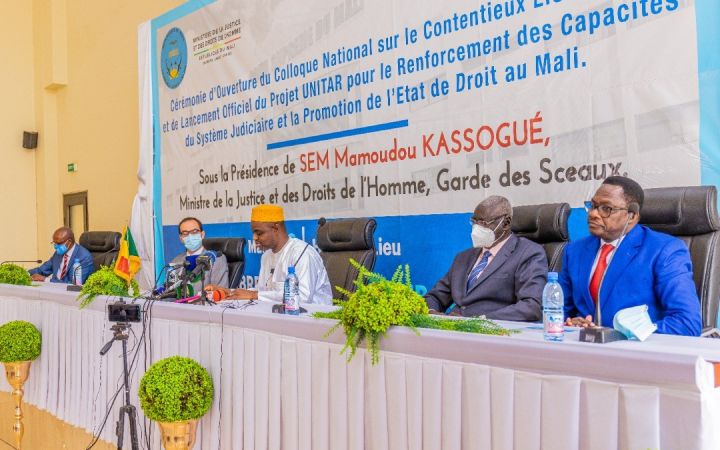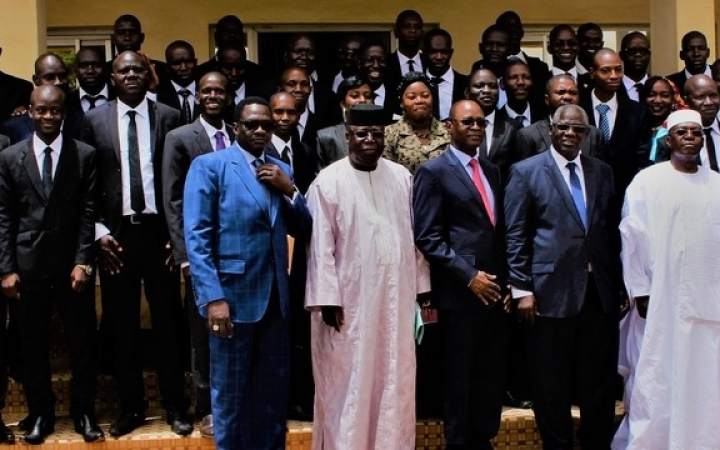Well-functioning national justice systems play an important part in efforts seeking to maintain or restore peace and stability in a country or region. Efficient and accountable, fair and accessible justice institutions enjoy the trust of the population and are capable of effectively fighting corruption and impunity, crime and terrorism. They promote and protect human rights and ensure that the principles of the rule of law, justice and democracy are observed and respected in the country.
A prerequisite for a well-functioning justice system is that its actors have the necessary knowledge and skills to perform their function professionally and that internal processes are modernised and, if possible, digitalized. The first aspect concerns the correct application of laws and procedures considering the rules governing the legal professions and the aspiration of their actors to ensure a quality of work at the highest professional level. The second aspect deals with improving the functioning of the justice institution, sharing of information, archiving of files, and the control system of judges, magistrates, public prosecutors and others.
Both aspects are equally important and interlinked as the following observation shows: the public's trust in the justice system is based on the professional knowledge and correct application of the law by justice actors - free of prejudice and equal for all. It is also based on the fact that court proceedings are conducted properly by set rules and deadlines and that everyone – whether defendant, plaintiff, victim, or witness – can rely on this.
The UNITAR project “Strengthening the Capacity of the Judicial System and Promoting the Rule of Law in Mali” reflects these observations.
The project was implemented with financial support from the Federal Republic of Germany from 2020 to 2023. Based on the findings of an assessment mission, it addressed capacity building in the areas of justice, rule of law and democracy, targeting legal professionals and representatives from civil society.
To ensure local ownership and sustainability, UNITAR chose as a key partner the Institut National de Formation Judiciaire (INFJ) based in Bamako. Its active involvement in the project also guaranteed the appropriate consideration of applicable laws and procedural rules as well as of the needs and expectations of the target group.
The project started with a training of qualified trainers, selected among experienced judges and other experts from Mali. They followed UNITAR’s “Comprehensive Training of Trainers Course” and received in-person advice from experienced trainers. The newly acquired competencies were put into practice when the trained trainers took over the project’s training activities – the core component of the project.
Supported by UNITAR subject matter experts, training was conducted on ethics and deontology, criminal procedure, writing of judgments and court decisions, preparation of judicial acts, securities and enforcement of court orders, counter-money laundering, protection of minors and vulnerable persons, and addressing gender-based violence, democratic principles and electoral law. The courses targeted judges, public prosecutors, judicial police officers, advocates, bailiffs, court commissioners, notaries, clerks as well as representatives from civil society, political parties and the media.
Each course included a module to support the modernization of the target group’s work. Modernization and digitalization were also addressed during study tours to Rwanda and Senegal. High-level participants from the Malian justice institutions met their counterparts to discuss on how to modernize and digitalize the justice system to make it more efficient and accountable.
The project ended in July this year having reached more than 1.600 training beneficiaries. But the fact that it was brought to closure does not mean that “the training wheel stands still”. Professionally trained trainers with extensive experience are now available to support the INFJ and can easily be integrated into other projects that include a training component. Training manuals covering various legal subjects have been handed to the INJF and will be of further use to trainers and trainees.
UNITAR believes that strengthened justice systems enhancing respect for the rule of law and promoting peace and justice increase the population’s trust in the capacity and the willingness of Governments to uphold and protect the rights of individuals, leading finally to the maintenance of peace and stability in these countries and the region. UNITAR therefore seeks to develop similar projects in West Africa.



